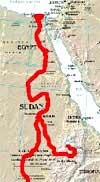|
|
The
Nile River - The Politics of Water
August 2001 Commentary by Rick Francona
Since time immemorial, the Nile has been the lifeblood of Egypt. In the spring, the waters of the river flooded, bringing black soil from the south and depositing it on the banks and creating the fertile Nile delta. Without the waters of the Nile to irrigate the dry deserts, Egypt would cease to exist. Despite the construction of the Aswan Dam in the late 1950’s and early 1960s, the Nile remains the single most important facet of Egyptian geopolitics. Although there had been dams constructed near Aswan as early as the late 19th Century, the first effective effort to control the flow of the Nile was the Aswan High Dam. The project itself underscores the politics involved in the river. To finance the massive project, Egyptian President Gamal ‘Abd Al-Nasir (Gamal Abdul Nasser) nationalized the Suez Canal in 1956. Construction on the dam began in 1960 with Russian (Soviet) technical and financial assistance. The lake created by the dam flooded numerous ancient archeological sites and modern villages, many of which were relocated at great expense. In conjunction with the building of the dam, Egypt and Sudan entered into the Agreement for the Full Utilization of the Nile Waters, signed in Cairo on November 8, 1959. This agreement replaced a limited agreement signed in 1929 between the two countries. The new agreement established the minimum flow of the Nile, and provided monetary payments to the Sudan for damages to be caused by the construction of the High Dam. “Egyptian interests…” First and foremost among Egypt’s vital national interests is the unimpeded flow of the Nile River. The phrase “Egyptian interests” has become synonymous with the flow of the river. Egypt has stated that it will protect the flow of the Nile even if that requires military action outside its borders. It has demonstrated that on numerous occasions. As early as the 1970s, Egyptian Air Force bombers and reconnaissance aircraft routinely patrolled Sudanese skies. In 1983, Libyan leader Mu’amar Al-Qadhafi sponsored a coup attempt in the Sudan. Egypt responded with the deployment of fighter aircraft to Egyptian airfields capable of striking targets in Libya, and deploying additional fighters to Sudan. Cairo also requested assistance from the United States, which deployed U.S. Air Force surveillance planes to support Egyptian operations. In 1984, when Libyan bombers struck targets in Omdurman, Sudan, Egypt once again moved aircraft to defend Sudan against Qadhafi’ attempts to destabilize the government. Although the Libyan bombings were in response to Sudanese support for Chadian guerrillas operating against Libyan expeditionary forces in Chad, Egypt assessed any threat to Sudan as a threat to the Nile. Relations between Egypt and Sudan have not always been good. Changes in Sudan took place n the late 1980s, and anti-Egyptian governments came to power. In 1995, Cairo blamed Sudan for an unsuccessful attempt to assassinate Egyptian President Husni Mubarak, further souring relations between the two nations. Despite the strained relations, Egypt and Sudan still cooperate on Nile flows based on the 1959 agreement. In 1998, faced with construction of new dams in Ethiopia, Cairo issued subtle statements that Egypt had no objections to continued development of the Nile’s headwaters as long as they did not “impact on Egyptian interests.” Ethiopia got the message, and in 2000, Sudan, Egypt, and Ethiopia signed an agreement that guarantees the uninterrupted flow of the Blue Nile. Bottom line Without the waters of the
Nile River, Egypt would cease to exist – quickly. From an aircraft flying
over Egypt, it is easy to see the stark contrast between the green narrow
strip of land that borders the Nile and barren desert a mere few hundred
meters away. Any threat to the flow of the Nile is a direct threat to Egypt’s
national survival. The countries of the Nile’s headwaters are in no condition
to take on the Egyptian military. The primary nation, Sudan, realizes that
to disrupt the Nile River would trigger swift and decisive Egyptian military
action.
|
 The
Nahr
An-Nil, Arabic for the Nile River, is the longest river system in the
world, stretching for over 4,000 miles from the source of the White Nile
at Lake Victoria in east central Africa. The White Nile flows generally
north through Uganda and into Sudan where it meets the Blue Nile (source
at Lake Tana, Ethiopia) at Khartoum. From Khartoum, the river continues
northwards into Egypt and on to the Mediterranean Sea.
The
Nahr
An-Nil, Arabic for the Nile River, is the longest river system in the
world, stretching for over 4,000 miles from the source of the White Nile
at Lake Victoria in east central Africa. The White Nile flows generally
north through Uganda and into Sudan where it meets the Blue Nile (source
at Lake Tana, Ethiopia) at Khartoum. From Khartoum, the river continues
northwards into Egypt and on to the Mediterranean Sea.